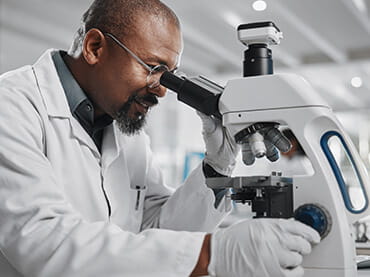The Division of Pediatric Pathology offers a full array of state of the art diagnostic services in the areas of Anatomic and Clinical Pathology for patients of the Children’s Hospital of Pittsburgh, one of the premier pediatric hospitals in the nation. Consultative services at the national and international levels are also provided. Classic and modern techniques are available, including an extensive immunohistochemistry menu, in situ hybridization and ultrastructural pathology. Molecular diagnostic techniques are also offered with support from the Molecular and Genomic Pathology Division. Pediatric postmortem examination is included in our services. Informatics expansion at departmental level allows for online consultation.
For second opinion consultations, visit the UPMC Digital Pathology Consultation Service.
Download our consult requisition form here.
Highlights
- National and international Pathology consultation in all areas of pediatric disease.
- Pediatric solid organ neoplasia, with active participation in the Pediatric Oncology Group (POG)
- Pathology of transplantation, including heart, lung, liver, bowel, kidney, bone marrow and post-transplant lymphoproliferative disorders
- Bowel motility disorders, including classic and modern approaches to diagnose Hirschsprung disease and associated disorders
- Pediatric melanocytic disorders, including giant nevi and neurocutaneous melanocytosis
- Histiocyte disorders, including Langerhans cell histiocytosis and dendritic cell disorders
Areas of Interest and Expertise
- Neural crest disorders and tumors, skin disorders (in particular, congenital melanocytic proliferations), testicular pediatric pathology
- Clinicopathologic correlations of pediatric neoplasia, especially liver and small round cell tumors
- Dermatopathology, especially vascular lesions
- Stem cell biology and cellular therapeutics, pediatric ENT pathology
- Dendritic cells and their disorders, childhood histiocytoses
Special Procedures
- Immunohistochemistry, including bright field immunohistology and immunofluorescence, with special panels applicable to pediatric diseases
- Electron microscopy for tumors, metabolic, muscle, renal and ciliary diseases
- In situ hybridization for Epstein-Barr virus and specific chromosomal aberrations
- Hirschsprung disease and other intestinal motility disorders: comprehensive diagnostic workup, including enzymatic histochemistry for acetylcholinesterase, and immunohistochemical detection of other relevant molecules
- Polymerase chain reaction-based assays for Bordetella pertussis and Chlamydia trachomatis
Consultation Services
The Department of Pathology at Children's Hospital of Pittsburgh is staffed by five board-certified Anatomic Pediatric Pathologists. In addition, extensive support from the Divisions of Neuropathology, Hematopathology, Transplant Pathology and others, allows for world-class expert support in specific areas. The interests of the staff cover all areas of pediatric diagnostic pathology, and a range of special procedures applicable to pediatric surgical pathology is offered. Special handling is necessary for some studies; therefore, it is advised to call ahead for specific requirements.
Visit the UPMC Pathology Consultation Services page to learn more.
Download a requisition form to submit your consultation request.
Training Programs
Residents from the Pathology Residency Program at the Department of Pathology, University of Pittsburgh Medical Center, rotate for six weeks in our Division, gaining exposure to essential elements in the sub-specialty.
In addition, an ACGME-approved Fellowship Program in Pediatric Pathology, one of the oldest and most prestigious in the country, is offered. This is a one-year postgraduate course for trainees who have graduated from a general pathology residency, are Board eligible in AP or AP/CP, and wish to pursue a career in academic pediatric pathology.
This program is designed to give participants guided and supervised exposure to the practice of complex, hospital-based pediatric pathology in all its facets. With an emphasis in academic initiatives, there is broad exposure to the surgical and autopsy pathology of children, including developmental, fetal, placental and perinatal areas. Our trainees are mentored and encouraged to participate in academic and research projects, as well as to present their work at national and international meetings and publish it. They also participate in the teaching of rotating AP or AP/CP residents. At the end of their training, our Fellowship graduates are expected to have acquired enough expertise to function as independent practitioners in pediatric patient care. Managerial aspects in Pediatric Pathology are included in our training, covering quality improvement and compliance practices, which should help them in becoming leaders in the specialty.












